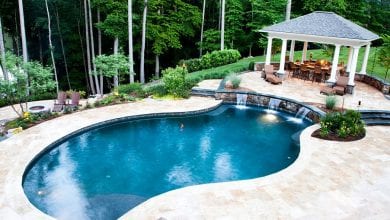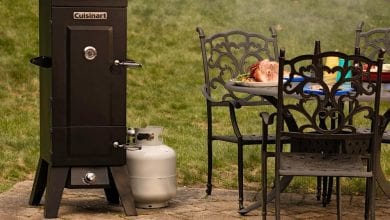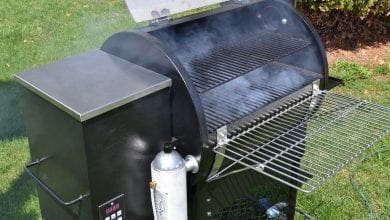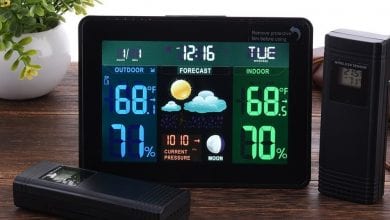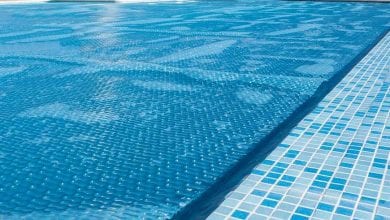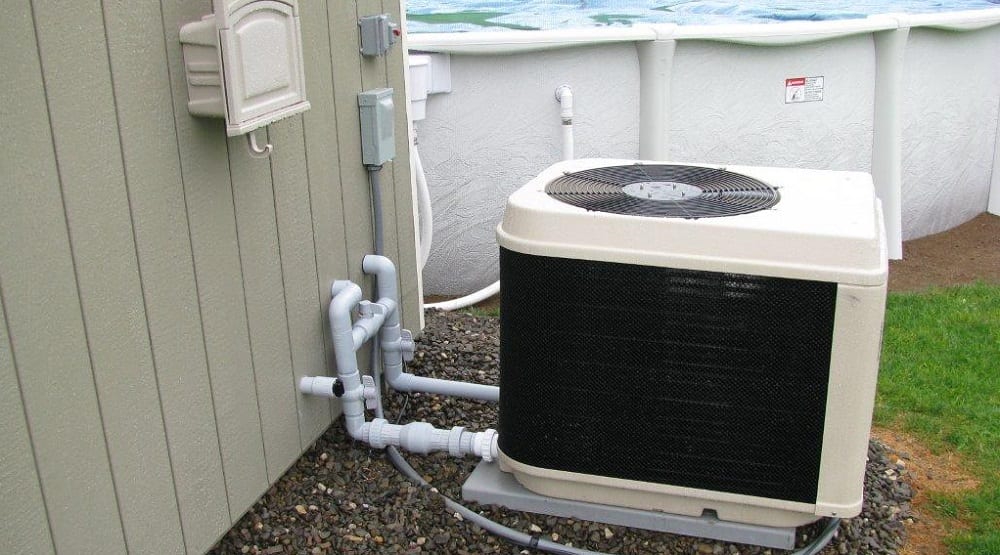
Best Pool Heat Pumps in 2022 – Reviewed
A big problem that many pool owners have with their pool is that they’re unable to use it part of the year. Most people are probably unable to use their pool all year round due to the water being too cold. Fortunately, there is something that will solve that problem and that’s a quality pool heat pump. And unlike the solar pool heaters that are frequently used, the consumer doesn’t have to rely on the sun’s rays to generate heat for their pool.
Of course, when we recommend that people purchase one of these heaters, the first question people ask is whether or not they’re cost-effective. And happily, we’re here to report that most of them are energy-efficient. Although these heaters do costs quite a bit upfront, once they’re purchased they are quite economical to run and usually last for a long time.
Quick Summary of Best Pool Heat Pumps



Reviews
Editor’s Choice: Hayward 140,000 BTU Pool Heat Pump
 Hayward is known for creating high-quality products and this product doesn’t deviate from their dedication to excellence. It’s a high-quality heat pump that is built to last and to provide the type of heating power that a pool owner might need. There are quite a few things to say about this product, but let’s begin our review talking about how this product is made—from its external shroud to its internal components. And this starts with an acoustic compressor cover that’s weather-resistant and helps to dampen the sound level of the pump’s internal components so that it runs more quietly.
Hayward is known for creating high-quality products and this product doesn’t deviate from their dedication to excellence. It’s a high-quality heat pump that is built to last and to provide the type of heating power that a pool owner might need. There are quite a few things to say about this product, but let’s begin our review talking about how this product is made—from its external shroud to its internal components. And this starts with an acoustic compressor cover that’s weather-resistant and helps to dampen the sound level of the pump’s internal components so that it runs more quietly.
This product also features a gold corrosion-resistant evaporator fin that’s remarkably durable. This pump also has UV-resistant body panels that keep the pump’s color from fading out over time and a polyethylene screen that helps to protect the evaporator coil so that the pump maintains peak efficiency at all times. Another thing that makes this product durable is that it’s made with a titanium heat-exchanger that’s designed to last a long, long time. It also features a profiled fan blade for more efficient airflow. And all of this is put together using the best stainless-steel hardware.
The result is a heat pump that can go the extra mile. It can deliver 140,000 BTUs of heating power and do it without bankrupting the pool owner. It also means that this is one of the most durable heat pumps around, and it’s especially resistant to chemical and saltwater corrosion. Yes, it is a little more expensive than some of the models currently available, but in our opinion, we feel that it’s one of the best pool heat pumps that can be bought these days. It’s a pump that’s going to do its job season-in and season-out, and it’s sure to provide the pool owner with many years of service. So yes, it’s a pool pump that we would recommend.
- It’s a 140,000 BTU-unit.
- It’s designed to be durable and efficient.
- It costs more than many other pool heat pumps.
Also Recommended: Pentair Master Temp High Performance Pool Heater
 This product from Pentair is named Master Temp, and there are a few good reasons why they have named it so. One of the biggest reasons for its name is that this is an absolute beast of a heater. It’s a 300,000 BTU unit that can heat a large pool several degrees an hour until it reaches its optimum swimming temperature. It’s also equipped with a very accurate digital thermostat that allows the pool owner to set the temperature they need their pool to achieve and they can then have faith that this heater will deliver that temperature precisely.
This product from Pentair is named Master Temp, and there are a few good reasons why they have named it so. One of the biggest reasons for its name is that this is an absolute beast of a heater. It’s a 300,000 BTU unit that can heat a large pool several degrees an hour until it reaches its optimum swimming temperature. It’s also equipped with a very accurate digital thermostat that allows the pool owner to set the temperature they need their pool to achieve and they can then have faith that this heater will deliver that temperature precisely.
Even though we found this product to not be built to the same level of quality as more expensive heat pumps, we felt that it was well made. This model featured a tough exterior that’s resistant to summer heat and is more than capable of handling rain, sleet, snow It’s also resistant to corrosion, so the pool owner doesn’t have to worry about it rusting out in their yard. All of that makes it suitable for outdoor installations, but if the consumer wants to install it indoors, that can be done as well. And it’s equipped with a manual gas shut-off that can be turned off as needed.
If there’s one thing that we didn’t like about this heat pump, it’s that this model makes a lot of noise while it’s running. While other models we’ve reviewed had sound-dampening features that kept noise levels down, this one didn’t seem to have that feature. With that being said, we still feel that it’s a good heater, and well worth it’s more than reasonable price. That’s why we have no problems recommending it to anyone who needs to heat a large pool quickly.
- It features a very accurate digital thermostat.
- It’s a 300,000 BTU heating unit.
- This model is extremely noisy when running.
Also Consider: Fibro Pool In-Ground Swimming Pool Heater
 Another heat pump that caught our attention, mainly because of its low price-tag, is this model from Fibro Pool. This model is designed for in-ground swimming pools and provides up to 55,000 BTUs of heating power. That’s good enough for most 8,000 to 10,000 square footage pools, but it’s simply not powerful enough for a pool that’s any larger. That means that it can be used for above ground pools that are 21-feet round or 15×30-feet oval, but not for pools any larger than that.
Another heat pump that caught our attention, mainly because of its low price-tag, is this model from Fibro Pool. This model is designed for in-ground swimming pools and provides up to 55,000 BTUs of heating power. That’s good enough for most 8,000 to 10,000 square footage pools, but it’s simply not powerful enough for a pool that’s any larger. That means that it can be used for above ground pools that are 21-feet round or 15×30-feet oval, but not for pools any larger than that.
Now that we got that out of the way, let’s talk about how this pool heat pump is made. This model has a slim profile, so it can fit just about anywhere, and it has a weather-proof case that keeps out the elements. It also features easy-to-use side access to standard fittings that reduce installation hassle and the time it takes to install it. This product can be run for approximately 25-cents an hour, on average, and it can be used to warm up pools in temperatures as low as 40-degrees. When you take all of these things into consideration, it’s easy to see that this is a heat pump that many people with smaller pools are going to want to use.
- This is an inexpensive heat pump.
- It doesn’t make a lot of noise.
- It only has an output of 55,000 BTUs.
Pool Heat Pump Guide
There are many things you need to consider when trying to extend the number of days you can enjoy your pool, and a pool heat pump is just one of them. Although you might think that these products are pretty similar, many variances make the good ones stand out, and the sub-par worth avoiding.
More energy efficient than a lot of gas heaters, they are a popular choice, but it is important to know what the best are capable of. This is why we have created the following buyer’s guide.
What To Look For In A Pool Heat Pump
Easy Installation
There are different types of pool heat pumps to choose from and some are easier to install than others. Anyone that knows a bit about pool maintenance might want to tackle this themselves but otherwise, installing a pool heat pump isn’t always simple.
You can pay for a professional to do the hard work, particularly if there are plumbing and electrical hook-ups involved.
Quiet Operation
If you have ever sat beside your pool, enjoying the relaxing warmth of the sun, only to have a noisy pool heat pump start to hum, you’ll know how much it can kill the mood.
This is not the case with a lot of the high-end products that despite having a high output, manage to operate quietly.
Energy Efficiency
A pool heat pump will have to work harder to heat larger bodies of water but when you buy the right fit, it still needs to be energy efficient. A lot will depend on your desired temperature and the starting temp of the water.
The cold it is, the harder it will have to work to bring it up to the temperature you need. This is going to cost more but it can be manageable if the product is energy efficient.
Durability
This is going to be even more important if you have a saltwater pool but chlorine can also leave its mark and cause a pool heat pump to deteriorate if you don’t buy a durable product.
When the inner parts have adequate protection, the unit should last a long time. Just make sure the heat exchanger is known for being durable (titanium is always good) as this is often a reason for some products to not last so long.
Warranty
Although most pool heat pumps are hard wearing and well-built, even buying from a reputable company can leave you with a product that is faulty or doesn’t work as well after a while. The best way to protect your purchase is by buying a product with a lengthy warranty.
Suitability
The size of your pool is a major factor in your decision. The pool heat pump needs to be capable of heating whatever you have in your backyard so make sure you find out the measurement before you purchase a heat pump.
If it does not have the output capability then you will find it makes barely any difference to the temperature.
Pool Heat Pump Gas Vs Electric
These are the two choices you have to consider and both of them have their benefits. The main plus point for gas is that they are cheaper to run, especially when the temp drops lower than 55 degrees. This is where an electric pool heat pump will have to work a lot harder.
If you need to pay for a direct route to the gas line then you might find it difficult to install and it can rack up the price.
What Size Pool Heat Pump Do I Need?
The required output of the pump is dependant on the size of your pool. If you use a pool cover then it might not need such a high output but as a general rule, anything up to 10,000 gallons will need around 50,000 BTU, a pool of 20,000 gallons will require 110,000 BTU in the colder months, and a 25,000-gallon pool will need 125,000 BTU’s.
Are Pool Heat Pumps Worth It?
Although the initial outlay can be higher than buying a heater, they are most efficient to run and will cost you less in the long run. They are often regarded as the most efficient method of heating a swimming pool.
When you buy the right spec for your pool they can work just as fast as other methods without the big hit in your bills.
How Much Does A Pool Heat Pump Cost?
We recommend investing in a pool heat pump that is known for being better than the budget options. The problem with these tends to be longevity as they are not made with quality materials to keep the cost down.
If you want a pool heat pump that is cost-effective but is still capable of giving you plenty more days in the pool, you should look for products that start around $1,500 but the truly high-end products will cost north of $3,000.
When Quickly Can A Heat Pump Heat My Pool?
Because of the way they are designed, a pool heat pump is better for extending the hours and days you can use the device during the warmer months.
This is why they are considered an excellent option for anyone who lives in a sunny or warm climate. If you want to keep the water warmer during the summer season or when it is coming to an end, they are the best option in terms of energy efficiency. Usually, they need between 1-3 days to heat the pool.
This varies depending on the model and the temperature of the air it has to work with.
How Warm Can A Pool Heat Pump Get My Pool?
A pool heat pump works better when the temperature is warmer, notably 50 degrees and above. If the air is warm, they can move the heat from the air and warm the water.
Anything below 50 degrees F and it is not going to be able to warm the pool.


